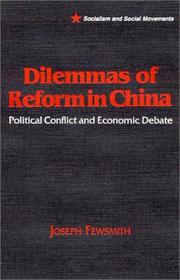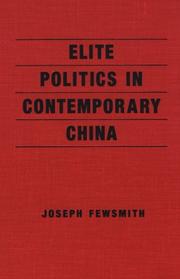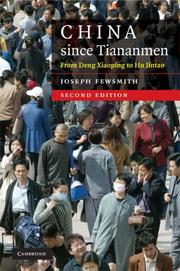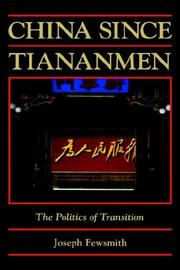| Listing 1 - 10 of 17 | << page >> |
Sort by
|

ISBN: 156324327X 1563243288 Year: 1994 Publisher: Armonk Sharpe
Abstract | Keywords | Export | Availability | Bookmark
 Loading...
Loading...Choose an application
- Reference Manager
- EndNote
- RefWorks (Direct export to RefWorks)
S10/0251 --- #abib:aleo --- China: Economics, industry and commerce--General works and economic history: since 1989 --- China --- Economic conditions --- -Economic policy --- -Politics and government --- -S10/0251 --- Cina --- Kinë --- Cathay --- Chinese National Government --- Chung-kuo kuo min cheng fu --- Republic of China (1912-1949) --- Kuo min cheng fu (China : 1912-1949) --- Chung-hua min kuo (1912-1949) --- Kina (China) --- National Government (1912-1949) --- China (Republic : 1912-1949) --- People's Republic of China --- Chinese People's Republic --- Chung-hua jen min kung ho kuo --- Central People's Government of Communist China --- Chung yang jen min cheng fu --- Chung-hua chung yang jen min kung ho kuo --- Central Government of the People's Republic of China --- Zhonghua Renmin Gongheguo --- Zhong hua ren min gong he guo --- Kitaĭskai︠a︡ Narodnai︠a︡ Respublika --- Činská lidová republika --- RRT --- Republik Rakjat Tiongkok --- KNR --- Kytaĭsʹka Narodna Respublika --- Jumhūriyat al-Ṣīn al-Shaʻbīyah --- RRC --- Kitaĭ --- Kínai Népköztársaság --- Chūka Jinmin Kyōwakoku --- Erets Sin --- Sin --- Sāthāranarat Prachāchon Čhīn --- P.R. China --- PR China --- Chung-kuo --- Zhongguo --- Zhonghuaminguo (1912-1949) --- Zhong guo --- Chine --- République Populaire de Chine --- República Popular China --- Catay --- VR China --- VRChina --- 中國 --- 中国 --- 中华人民共和国 --- Jhongguó --- Bu̇gu̇de Nayiramdaxu Dundadu Arad Ulus --- Bu̇gu̇de Nayiramdaqu Dumdadu Arad Ulus --- Bu̇gd Naĭramdakh Dundad Ard Uls --- Khi︠a︡tad --- Kitad --- Dumdadu Ulus --- Dumdad Uls --- Думдад Улс --- Kitajska --- -#abib:aleo --- Economic policy --- Politics and government --- 1976 --- -China

ISBN: 0765606860 0765606879 Year: 2001 Publisher: Armonk Sharpe
Abstract | Keywords | Export | Availability | Bookmark
 Loading...
Loading...Choose an application
- Reference Manager
- EndNote
- RefWorks (Direct export to RefWorks)
Elite (Social sciences) --- Political leadership --- Democratization --- Elite (Sciences sociales) --- Leadership politique --- Démocratisation --- China --- Chine --- Politics and government --- Politique et gouvernement --- S06/0424 --- S06/0423 --- S11/0708 --- China: Politics and government--CCP: since 1989 --- China: Politics and government--CCP: 1976 - 1989 --- China: Social sciences--Elite --- Démocratisation

ISBN: 9780521686051 9780511790454 9780521866934 Year: 2008 Publisher: Cambridge Cambridge University Press
Abstract | Keywords | Export | Availability | Bookmark
 Loading...
Loading...Choose an application
- Reference Manager
- EndNote
- RefWorks (Direct export to RefWorks)

ISBN: 1107123984 128041913X 0511790953 0511174772 0511041756 051115481X 0511325258 0511044151 9780511041754 9780511044151 9780521806343 0521806348 9780511790959 0521001056 9780521001052 9781107123984 9780511174773 9780511325250 Year: 2001 Publisher: Cambridge Cambridge University Press
Abstract | Keywords | Export | Availability | Bookmark
 Loading...
Loading...Choose an application
- Reference Manager
- EndNote
- RefWorks (Direct export to RefWorks)
China Since Tiananmen is the first book to look comprehensively at the intellectual and political trends in the decade since the Tiananmen Incident (1989) to assess the ways in which China has changed. Fewsmith looks on the one hand at the intellectual critique of the enlightenment tradition, which had previously held a sacrosanct position in the thinking of liberal intellectuals since the May Fourth Movement of 1919, to explain the rise of neo-conservatism and nationalism over the past decade. On the other hand, he examines the maneuverings of elite political actors to understand the constraints they operate under and how the conduct of elite politics has changed since Tiananmen. Together, these two approaches give a more comprehensive and realistic assessment of the forces that drive China today. These trends are of great importance for anyone trying to understand Sino-US relations.
Political leadership --- China --- Politics and government --- Economic policy --- History --- S06/0224 --- S06/0424 --- China: Politics and government--People's Republic: central government: since 1976 --- China: Politics and government--CCP: since 1989 --- Leadership politique --- Chine --- Politique et gouvernement --- Politique économique --- Histoire --- Social Sciences --- Political Science
Book
ISBN: 9781139381703 9781107031425 9781107612549 9781139612982 1139612980 9781139626002 1139626000 1139381709 9781139616706 1139616706 1107031427 1107612543 1139611127 1107237750 1107255694 1139622285 1283943565 Year: 2013 Publisher: Cambridge [England] New York
Abstract | Keywords | Export | Availability | Bookmark
 Loading...
Loading...Choose an application
- Reference Manager
- EndNote
- RefWorks (Direct export to RefWorks)
"In the 1990s China embarked on a series of political reforms intended to increase, however modestly, political participation to reduce the abuse of power by local officials. Although there was initial progress, these reforms have largely stalled and, in many cases, gone backward. If there were sufficient incentives to inaugurate reform, why wasn,Ŵt there enough momentum to continue and deepen them? This book approaches this question by looking at a number of promising reforms, understanding the incentives of officials at different levels, and the way the Chinese Communist Party operates at the local level. The short answer is that the sort of reforms necessary to make local officials more responsible to the citizens they govern cut too deeply into the organizational structure of the party"--
Democratization --- Local government --- Political participation --- S06/0223 --- China: Politics and government--People's Republic: general: since 1976 --- China --- Politics and government. --- Social Sciences --- Political Science

ISBN: 9780511415159 051141515X 9780511410536 0511410530 9780511412486 0511412487 0511414471 9780511414473 0511411936 9780511411939 0521686059 0521866936 1107179017 1281751146 9786611751142 0511790457 051141286X 0511413785 Year: 2008 Publisher: New York : Cambridge University Press,
Abstract | Keywords | Export | Availability | Bookmark
 Loading...
Loading...Choose an application
- Reference Manager
- EndNote
- RefWorks (Direct export to RefWorks)
In this edition of his path-breaking analysis of political and social change in China since the crackdown in Tiananmen Square in 1989, Joseph Fewsmith traces developments since 2001. These include the continuing reforms during the final years of Jiang Zemin's premiership and Hu Jintao's succession in 2002. Here the author also considers social trends and how Chinese citizens are starting to have a significant influence on government policies. As Fewsmith - a highly regarded political scientist and a seasoned China-watcher - observes, China is a very different place since Tiananmen Square. In the interim, it has emerged from isolation to become one of the most significant players on the world stage. This book explains the forces that have shaped China since Tiananmen.
Political leadership --- China --- Politics and government --- History --- Social Sciences --- Political Science
Book
ISBN: 1108923852 1108924662 1108912532 1108831257 Year: 2021 Publisher: Cambridge, United Kingdom ; New York, NY : Boston University, Cambridge University Press,
Abstract | Keywords | Export | Availability | Bookmark
 Loading...
Loading...Choose an application
- Reference Manager
- EndNote
- RefWorks (Direct export to RefWorks)
Understanding Chinese politics has become more important than ever. Some argue that China's political system is 'institutionalized' or that 'win all/lose all' struggles are a thing of the past, but, Joseph Fewsmith argues, as in all Leninist systems, political power is difficult to pass on from one leader to the next. Indeed, each new leader must deploy whatever resources he has to gain control over critical positions and thus consolidate power. Fewsmith traces four decades of elite politics from Deng to Xi, showing how each leader has built power (or not). He shows how the structure of politics in China has set the stage for intense and sometimes violent intra-elite struggles, shaping a hierarchy in which one person tends to dominate, and, ironically, providing for periods of stability between intervals of contention.
Political leadership --- Communism --- China --- Politics and government.
Book
ISBN: 1009070150 1316513564 1009075748 1009081985 Year: 2022 Publisher: Cambridge, United Kingdom : Cambridge University Press,
Abstract | Keywords | Export | Availability | Bookmark
 Loading...
Loading...Choose an application
- Reference Manager
- EndNote
- RefWorks (Direct export to RefWorks)
Forging Leninism in China is a re-examination of the events of the Chinese revolution and the transformation of the Chinese Communist Party from the years 1927 to 1934. Describing the transformation of the party as 'the forging of Leninism', Joseph Fewsmith offers a clear analysis of the development of the party. Drawing on supporting statements of party leaders and a wealth of historical material, he demonstrates how the Chinese Communist Party reshaped itself to become far more violent, more hierarchical, and more militarized during this time. He highlights the role of local educated youth in organizing the Chinese revolution, arguing that it was these local organizations, rather than Mao, who introduced Marxism into the countryside. Fewsmith presents a vivid story of local social history and conflict between Mao's revolutionaries and local Communists.
Communism --- History. --- Zhongguo gong chan dang --- China --- Politics and government --- Zhong guo gong chan dang --- Chung-kuo kung chʻan tang --- Chūgoku Kyōsantō --- Chungguk Kongsandang --- 中国共产党 --- 中國共產黨 --- КПК --- KPK --- Komunistická strana Číny --- Komunistička partija Kine --- Communist Party of China --- Chinese Communist Party --- Communist Party (China) --- Gong chan dang (China) --- 共产党 (China) --- Коммунистическая партия Китая --- Kommunisticheskai︠a︡ partii︠a︡ Kitai︠a︡ --- Shina Kyōsantō --- Китайска комунистическа партия --- Kitaĭska komunisticheska partii︠a︡ --- Partido Comunista de China --- PCCh --- Parti communiste chinois --- CCP --- Partito comunista cinese --- KPCh --- Kommunistische Partei Chinas --- К.П.К. --- K.P.K. --- CPC --- C.C.P. --- Partia Komuniste të Kinës --- Đảng cộng sản Trung quốc --- Zhong gong --- 中共 --- Pcc --- P.C. Chino --- ХКН --- KhKN --- Хятадын Коммунист нам --- Khi︠a︡tadyn Kommunist nam
Book
ISBN: 9781009070157 9781316513569 9781009074315 Year: 2022 Publisher: Cambridge, United Kingdom Cambridge University Press
Abstract | Keywords | Export | Availability | Bookmark
 Loading...
Loading...Choose an application
- Reference Manager
- EndNote
- RefWorks (Direct export to RefWorks)
Book
ISBN: 9781108831253 9781108926607 9781108923859 Year: 2021 Publisher: Cambridge Cambridge University Press
Abstract | Keywords | Export | Availability | Bookmark
 Loading...
Loading...Choose an application
- Reference Manager
- EndNote
- RefWorks (Direct export to RefWorks)
| Listing 1 - 10 of 17 | << page >> |
Sort by
|

 Search
Search Feedback
Feedback About UniCat
About UniCat  Help
Help News
News